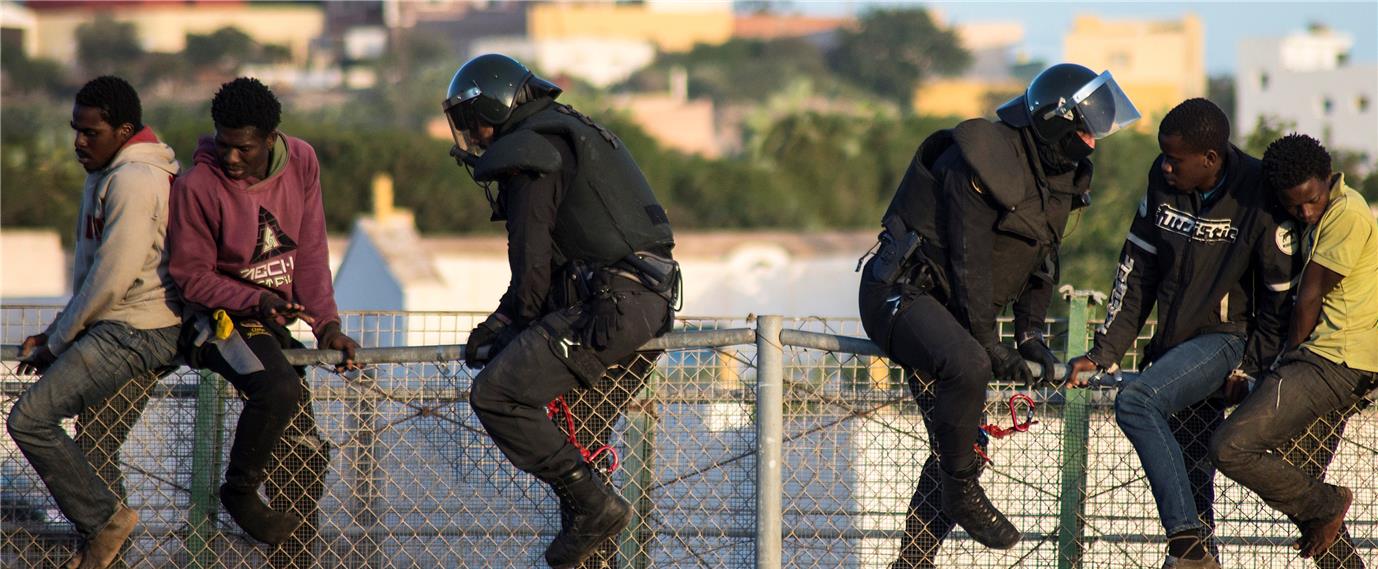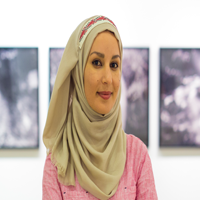لم "تسخن بلاصته" بعد (أي مكانه) وفق اللهجة المغربية، إلّا ودونالد ترامب، الرئيس الأميركي الجديد، يقرر بناء جدار بين أميركا والمكسيك حداً للهجرة غير الشرعية.
مع التوقيع الأخير لترامب، ربما سيشهد العالم تغيراً في حركات الهجرة، وقد يكون ذلك مناسبة للأصوات اليمينية في عدة دول بأوروبا ترفض المهاجرين، لتزيد من إصرارها على المطالبة بإغلاق الحدود أمام المهاجرين واللاجئين.
بلغ عدد المهاجرين عام 2015 في العالم 244 مليون مهاجر، أي ما نسبته 3.3% من سكان العالم. وحسب وكالة الحدود التابعة للاتحاد الأوروبي فإن 181 ألف مهاجر وصلوا إلى إيطاليا من شمال إفريقيا.
تزداد الأمور تعقيداً بالنسبة للإعلام فيما يخص الهجرة، فهو أمام تحدِّ لإعادة التعريف باللاجئ أو المهاجر وظروفه والفصل بينها وبين مسائل أخرى كـ"الإرهاب" والتطرف والأمن.
يقع المغرب في الجهة الجنوبية من أوروبا، وقد بدأت سياسته في الهجرة تبرز في السنوات السبع الأخيرة، علماً أن عدد المهاجرين المغاربة في العالم وصل ما بين العامين 2010 و2015 إلى 311 ألف مهاجر وفق إحصائيات صندوق الأمم المتحدة للسكان.
في هذا السياق، تراجع دور المغرب في تصدير المهاجرين وتحوّل إلى بلد مستضيف مستفيداً من اتفاقيات وقعها مع الاتحاد الأوروبي وقبلها إسبانيا للحدّ من الهجرة مقابل معونات مادية تساعد المغرب في توطين المهاجرين وتوفير ظروف أفضل لعيشهم، وقد وصل عدد المهاجرين ممن حصلوا على بطاقة الإقامة في المغرب بين عاميّ 2014 و2016 إلى 32 ألف مهاجر ينحدر معظمهم من دول جنوب الصحراء، فيما حصل 680 مهاجراً منهم على بطاقة اللجوء السياسي.
يتعامل الإعلام المغربي الرسمي وغير الرسمي بشكل شبه يوميّ مع مواضيع الهجرة منذ عقدين تقريباً، تماما كالإعلام الإسباني، جاره على الضفة الأخرى. صحفيون مغاربة وإسبان يتحدثون لـ"مجلة الصحافة" حول تجربة الإعلام المغربي والإسباني في تعريف المهاجر في كلا المجتمعين، ما ظروفه ودوافعه؟ ما البيئة القادم منها؟ ما طموحاته؟ ما برامج الإدماج أو فرص العمل التي وجدها؟ ما الصور النمطية التي يخلقها الإعلام حوله؟ ما تأثير الهجرة على العلاقات الدبلوماسية بين الطرفين؟ إلى غيرها من الأسئلة..
الإعلام المغربي وصورة المهاجر الناجح
تعرّض الإعلام المغربي لقضايا الهجرة في العقدين الأخيرين وعرف "تطوّراً" وفق نبيل دريوش، الصحفي في قناة "ميدي1". هذا التطور مبني على انتقاله من "مواكبة ظاهرة قوارب الموت وما خلفته من مآسٍ عبر تقارير وتحقيقات مكتوبة أو متلفزة إلى رصد حياة المهاجرين الأفارقة بعد تحوّل المغرب في السنين الأخيرة إلى مستقبل للمهاجرين بدلاً من مصدِّرٍ لهم بعد شروعه في تسوية أوضاعهم" وفق "الاستراتيجية الجديدة في تدبير الهجرة". اقتصرت المعالجة الأولى للهجرة المرتبطة بقوارب الموت على "إبراز الوجه البشع للهجرة غير الشرعية، بنقل صور الجثث والقوارب المتجهة صوب إسبانيا. وكانت الصحافة المكتوبة سبّاقة في تناولها فيما تأخر التلفزيون في معالجة الظاهرة وكان يكتفي بنقل الأخبار العادية في النشرات" بحسب دريوش.
كانت القناة الثانية المغربية (2M) أول من أنجز تحقيقاً تلفزيونياً أعدّه الصحفي محمد خاتم عام 2001. أثار التحقيق جدلا في حينه، حيث كانت إدارة القناة تتجنب التطرق للهجرة السرية "مخافة إثارة حفيظة المهاجرين المغاربة الذين سيعتبرونه إضراراً بصورتهم".
كان الإعلام حينها يركز على النموذج المهاجر الناجح مع تفادي الغوص في ظاهرة الهجرة غير الشرعية، رغم أنها سياسة إعلامية كانت تشجع الشباب العاطل عن العمل بطريقة ما، إلى الهجرة السرية.
أما فيما يخص المعالجة الإعلامية للمهاجرين الأفارقة يقول دريوش "ركزت وسائل الإعلام الحديث عن معاناتهم في مخيمات بليونش قرب سبتة وغوروغو قرب مليلية شمال المغرب، لكنها معالجة عرفت انزلاقات عند عدد محدود من الجرائد بطريقة عنصرية، فقد وصفتهم إحدى الصحف بـ"الجراد الأسود" الذي يغزو المغرب".
عاملان أثّرا على المعالجة الإعلامية تلك؛ أولهما، ارتباط المغرب مع الاتحاد الأوروبي باتفاقيات للحد من قوارب المهاجرين إلى قارة "الأحلام"، وهي اتفاقيات وصفها دريوش بـ"الصعبة" إلّا أنها بالمقابل منحت امتيازات للمغاربة، ففي عام 2016 أصدرت السفارة الإسبانية ما يفوق 50 ألف تأشيرة سياحة للمغاربة، كذلك لعب التوجه السياسي للمغرب نحو أفريقيا دورا يتعلق بالعمل الحقوقي على ملف الهجرة وتسوية وضعية المهاجرين الأفارقة وإظهار المغرب كبلد استقرار، "مما أثر على المعالجة الإعلامية التي بدأت تتحدث عن اندماج المهاجرين الأفارقة في المجتمع المغربي والبحث عن نماذج ناجحة بينهم" وفق دريوش.
يشير الصحفي عبد الرحيم الزباخ الذي يعمل في صحيفة "لادابيش" إلى نوعين من الهجرة عرفها المغرب، واحدة في التسعينيات من القرن المنصرم، والأخرى ما بعد 2010، تحولت على إثرها طنجة من مدينة عبور إلى مكان إقامة، "إلّا أننا ما زلنا نسمع عن قوارب الموت التي يمتطيها الأفارقة نحو الحلم الأوروبيّ".
وعن مراعاة الإعلام المغربي لصورة المهاجرين والالتزام بميثاق الشرف يقول عبد الرحيم: "عرفت منطقة الشمال حلقات ونقاشات وتوعية حول المحتوى الإعلامي الخاص بالمهاجرين، اليوم نجد أن الخط التحريري قد تغيّر نسبياً وشرع صحفيون في أخذ الحيطة والحذر والموضوعية، ويبقى ذلك نسبياً، كذلك تبقى التغطيات موسمية تتعلّق إما بتسوية أوضاعهم أو هروبهم إلى إسبانيا".. يردف: "ما زالت الهجرة موضوعا ثانويّاً في الإعلام المغربي، يُخصَّص له حيز صغير وقصير زمنياً ونحتاج لكثير من التحري والموضوعية، كذلك إلى تدريب الصحفيين وتمكينهم من امتلاك الأدوات اللازمة لذلك، نحن بالنهاية نتعامل مع ظروف ومآسٍ إنسانية، وما زال الإعلام المغربي يصعب عليه تعريف الجمهور بالمهاجر الإفريقي أو غيره".
تاريخ منغلق يؤثر في الإعلام الإسباني
تخضع مواضيع الهجرة القادمة من المغرب في الصحافة الإسبانية لتأثيرات نابعة من العلاقات الدبلوماسية بين الطرفين، يقول عبد الرحيم: "يتعامل الإعلام الإسباني حالياً بموضوعية فيما يخص الهجرة إلّا أن الجرائد والمواقع المحلية التي تمسها الهجرة بشكل مباشر خاصة في منطقة "أندلسيا" ما زالت تستخدم مصطلحات عنصرية غير لائقة وهو أمر يعود لتكوين الصحفي وسياسات الجريدة في التحرير".
أما دريوش فيقدّم عدة معطيات لمعالجة الإعلام الإسباني لظاهرة الهجرة إلى أراضيه، بقوله: "ظلت إسبانيا بلداً مصدراً للهجرة بعد خروج المسلمين منه في القرنين الخامس والسادس عشر وظلّ منغلقاً على نفسه، وهذان العاملان يتحكمان بتعامل المجتمع الإسباني ووسائل الإعلام مع ظاهرة الهجرة غير الشرعية، وأظن أن كتاب "لا موروس على الشاطئ" للصحفي الإسباني خوان خوسي تاييس، يعكس التخوف الذي رافق بدايات ظاهرة قوارب الموت، فهذا العنوان هو في الأصل مَثَلٌ إسبانيٌّ كان يقال ليدل على عدم وجود أي خطر في الشواطئ ويقصد به أي غزو من طرف الموروس أو المغاربة للشواطئ الإسبانية مع ما نسميه نحن بفتح الأندلس. كل تلك الخلفيات تحكمت في المعالجة الإسبانية للظاهرة، ونجد أنها انفجرت تماما مع أحداث أليخيدو شهر فبراير 2000 بسبب الاحتقان ضد المهاجرين المغاربة بهذه البلدة الصغيرة بضواحي مدينة الميرية".
لقد فُرضت الهجرة على إسبانيا مع نموها الاقتصادي أواخر القرن الماضي، ويرى دريوش المتخصص في العلاقات المغربية- الإسبانية بأنه "يوجد اختلاف في التعامل بين المهاجرين من أصول مسلمة وعلى رأسهم المغاربة باعتبارهم أكبر مجموعة للمهاجرين وبين مهاجري أميركا اللاتينية الذين تعتبرهم وسائل الإعلام أكثر اندماجا، كما أن هذه الهوة اتسعت مع الهجمات التي ضربت عدة دول أوروبية بينها مدريد في 11 مارس/آذار 2004، وصار هناك خلط بين الهجرة ومفهوم الإرهاب وبين الإسلام وتنظيمات متشددة، ما عبرّت عنه مقالات الصحفي الإسباني إغناسيو سيمبريرو، ال في قضايا المغارمختصة بقضايا الهجرة و الإسلام الواردة في كتابه الأخير "إسبانيا التي تعبد الله"، مع صورة لخارطة إسبانيا وفي وسطها مهاجرون مسلمون يصلون".
في "إسبانيا التي تعبد الله" يذيع الإعلام الإسباني حالات اعتقال لمغاربة بتهم علاقاتهم بتنظيم الدولة أو متطرفين، الأمر الذي يعيد تشكيل صور إعلامية لدى الجمهور حول هذه الفئة القادمة من خلفيات تحكمها أيديولوجيات وإرث مختلف، يقول دريوش "تختلف طريقة تعامل البلدين مع الاعتقالات وفق قوانينها وتقاليدها، أحيانا يكون هناك تعاون في اعتقال بعض المشتبه بهم، لكن النقاش يكون أعمق بإسبانيا حول الظاهرة منه بالمغرب، حيث تكتفي وسائل الإعلام ببث البلاغات الرسمية، وهنا يتحول الحديث اليومي في إسبانيا إلى خليط لا يفرق بين المهاجر والمتشدد.. وفي نظر العديدين كل المهاجرين هم متشددون وكل مسلم هو بالضرورة مشروع إرهابي".
تؤكد الصحفية الإسبانية بياترس ميسا أيضا على دور الإعلام في التضليل وتشكيل صور نمطية سلبية جديدة عن المهاجرين.. "علينا أن نغيّر الصورة التي يصنعها الإعلام حول المهاجرين سواء في إسبانيا أو المغرب والتي خلقت لدى الجمهور الخوف والتجاهل والعنصرية".
تعمل ميسا من الرباط لصالح موقع "cope.es" وموقع "elperidico.com" وتهتم بقضايا الهجرة العابرة من مالي وصولاً إلى ليبيا والمغرب، تقول: "عملت مع مهاجرين أفارقة قادمين إلى المغرب كي يعبروا إلى أوروبا، والعديد منهم ينتمي لعائلات غنيّة ومتعلّمة وقد هبطوا بمطار الدار البيضاء، إلّا أنهم علقوا بالمغرب نتيجة تعقد إجراءات الفيزا إلى أوروبا.. لقد قابلت الكثير من هذه العائلات وقد أمسوا مهاجرين غير شرعيين بالمغرب، كما يمكن أن نجد أناسا هاربين من أوضاع اجتماعية وسياسية، ويجب كإعلاميين أن نترجم للرأي العام بأن المهاجرين ليسوا قادمين فقط من أجل تحسين أوضاعهم الاقتصادية بل هم يعانون من أوضاع سياسية واجتماعية سيئة بالأساس".
على الضفة الشمالية للمتوسط، تؤكد ميسا أن "إسبانيا لن تغلق حدودها أمام المهاجرين كونها تتبع سياسة الاتحاد الأوروبي في ذلك، وقد استقبلت السوريين كلاجئين سياسيين جعلت الشعب الإسباني يتعاطف معهم، لكن المهاجرين ذوي البشرة السوداء ما زالت مشكلتهم ذات تمثلات اقتصادية يُتصورّ على أنهم قادمون للحصول على فرص عمل فقط، ولا يؤخذ بعين الاعتبار أنهم هاربون من أوضاع سياسية. لن أقول بأن إسبانيا عنصرية ولكن يجب أن نغيّر منظورنا عن الهجرة. يجب أن نتحدث الآن عن مستقبلنا الذي يتعولم وإسبانيا لن تكون بيضاء بعد ذلك، ويجب على الإعلام توضيح الصورة الصحيحة للجمهور الذي لا يعرف شيئاً عن الهجرة ". وتشير إلى أنّ "المغرب وإسبانيا يتعاونان حالياً من أجل القضاء على مافيات تجار البشر على الحدود بين البلدين للحد من الهجرة السرية".
خافيير بالنثويلا، الصحفي السابق في صحيفة "إلباييس" الإسبانية يجد بأن "الصحافة الإسبانية تقوم بتغطية جيدة لقضايا الهجرة، وتعتبرها حديثا إعلاميا يوميا يصاحبه الجدال والنقاش حول سياسات الاتحاد الأوروبي" ويشير إلى أن "الصحفيين الإسبان يتابعون عن كثب موجات الهجرة القادمة من شمال المغرب ومن ليبيا ولبنان وتركيا واليونان ومخيمات المهاجرين في شرق أوروبا كذلك من قوارب العبور في المتوسط".
يجد بالنثويلا أن إسبانيا ما زالت دولة مصدرة للهجرة، حيث تهاجر فئة كبيرة من الشباب الإسبان بحثاً عن فرص عمل في الخارج، لذلك "يجب على الإعلام أن يفهم دوافع المهاجرين قبل الحديث عن أي شيء".








































